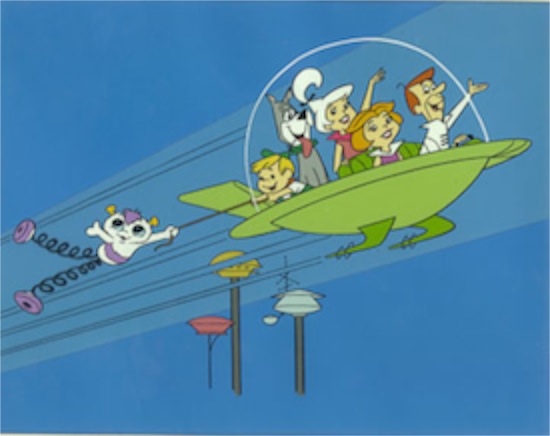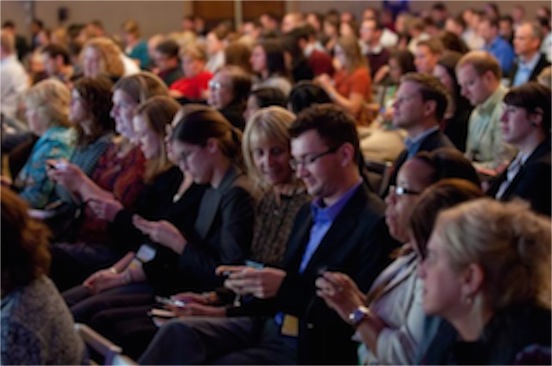Taking in the world
11/06/12 05:11
Somehow, I never developed a taste for science fiction. I’ve read a few novels of the genre, but seem to prefer other books for my casual reading. I’m not a big fan of television or of the movies, so I haven’t seen very many of the great science fiction movies that have been produced. Still, I think I appreciate science fiction. Just because it isn’t my choice for my free time doesn’t mean that I can’t see its value.
Some people think that science fiction is relatively accurate at predicting the future. The imaginative novelist Ray Bradbury, who recently passed away at the age of 91, wrote of several things that later came to be true. He describes a world where people are obsessed with their flat screens, where the news has a short attention span and where there is increased surveillance – in short, his novels describe a world very much like the one in which we live today. Bradbury and other writers of the genre often explore not only the devices and gadgets of the future, but the inner workings of human relationships. I think that one of the appeals of science fiction is the simple fact that it explores issues that matter to people like social isolation, the power of government, and the manipulative trends of news media.
 I am pretty sure that I wouldn’t have any gift for writing science fiction. Every time I try to imagine the future, I am either really far from what occurs or I am describing something that has already happened. When I was younger, I was absolutely convinced that we would all use private airplanes as our primary method of transportation. That one doesn’t seem to be on the horizon. I also believed that space travel would be common for everyday people. I fully expected that I would have the opportunity to travel in space, at least to near objects such as the moon. It doesn’t seem like either of those predictions will come to pass anytime soon.
I am pretty sure that I wouldn’t have any gift for writing science fiction. Every time I try to imagine the future, I am either really far from what occurs or I am describing something that has already happened. When I was younger, I was absolutely convinced that we would all use private airplanes as our primary method of transportation. That one doesn’t seem to be on the horizon. I also believed that space travel would be common for everyday people. I fully expected that I would have the opportunity to travel in space, at least to near objects such as the moon. It doesn’t seem like either of those predictions will come to pass anytime soon.
On the other hand, were I to write about how people behave in the future, I might focus on personal communications devices such as portable wireless phones with small devices that could be inserted into the ear for hands free communication or homes wired with remotes for everything from turning on and off the lights to opening and closing the blinds. I might be tempted to write about hidden surveillance cameras in gas stations and grocery stores or devices that allowed individuals to watch movies whenever and wherever they wanted. None of these things belong to the future – they surround us every day.
The world as it is seems to me to be a sort of science fiction story every day. I learned to type on a manual typewriter. There were no computers in my high school and only a couple of electric typewriters. The cell phone in my pocket has more computing power than the computer that occupied an entire basement at the state university when I was in college. That device was far to expensive for the small liberal arts college I attended to afford. Scientific advances and world-changing events are so common that I don’t seem to need fiction to have a sense of a futuristic society.
 I remember some of my early experiences with walls that were totally covered with televisions. It used to be a relatively common marketing technique for a large electronics store to line up a large number of televisions on shelves on the wall and turn them all on at the same time. I guess this was to enable customers to compare image quality. The practice is not as common as it was a few years ago simply because the screens on the televisions are getting bigger and bigger. At any rate, I remember walking into an electronics superstore in Portland Oregon and having a sensation that was similar to vertigo. There were so many moving images that my brain couldn’t figure out where to focus. The motion of the images on the screen was overwhelming. I felt a little bit queasy. I simply couldn’t take it all in.
I remember some of my early experiences with walls that were totally covered with televisions. It used to be a relatively common marketing technique for a large electronics store to line up a large number of televisions on shelves on the wall and turn them all on at the same time. I guess this was to enable customers to compare image quality. The practice is not as common as it was a few years ago simply because the screens on the televisions are getting bigger and bigger. At any rate, I remember walking into an electronics superstore in Portland Oregon and having a sensation that was similar to vertigo. There were so many moving images that my brain couldn’t figure out where to focus. The motion of the images on the screen was overwhelming. I felt a little bit queasy. I simply couldn’t take it all in.
I have heard the experience described as “sensory overload.”

It doesn’t take a roomful of electronic devices for my senses to be filled. A few minutes ago I stepped out of the house into the sunrise. My bare feet could feel the chilly dampness of the grass underneath and between my toes. My ears were straining to distinguish individual calls from the songs of hundreds of birds greeting the sunrise. My eyes caught the bright yellow-orange-pink of the predawn glow on the east, spreading to the north. But I could also make out the needles on the trees. I took a picture, but the camera, a modern digital device, couldn’t see as much as I. I have a wider field of vision. And my eyes could see in a wider range of light. The camera had to either wash out the colors of the sky, or turn the foreground into black silhouettes. My brain was sorting out many different smells. Wet pine trees have a wonderful aroma, but I could also smell the distinctive savor of blooming marigolds and the loamy smell of the cedar mulch. The sage in the neighbor’s back yard came to my mind as well along with a thousand different smells that I have yet to identify. The chill of the breeze surrounded my body. My senses were working overtime. I wasn’t connected to any electronic device.
 I think that too often people who are totally wired aren’t really overloaded, but rather that they fail to take in so much of the world that surrounds them. Instead of sensory overload, they may be experiencing sensory poverty. I watch people walking on the greenbelt with their ear buds plugged in. I’ve done it before. I can listen to a radio program or podcast and get exercise at the same time. But it drives me nuts to try to walk on a treadmill in a health club. The blaring televisions distract me far too much. The best way to walk for me is outside where I can’t control the temperature and where the television is left behind.
I think that too often people who are totally wired aren’t really overloaded, but rather that they fail to take in so much of the world that surrounds them. Instead of sensory overload, they may be experiencing sensory poverty. I watch people walking on the greenbelt with their ear buds plugged in. I’ve done it before. I can listen to a radio program or podcast and get exercise at the same time. But it drives me nuts to try to walk on a treadmill in a health club. The blaring televisions distract me far too much. The best way to walk for me is outside where I can’t control the temperature and where the television is left behind.
I think that constantly connected people who never stray from their devices may, in fact be experiencing sensory deprivation. They listen to only one sound when they are surrounded by thousands of melodies. They look at only a small screen when the world surrounds them with ultra-wide screen vistas.
I suspect that multi tasking is just another way of saying: “not paying attention.”
I love stories. But I don’t seem to need science fiction. The real world is exciting enough for me.
Some people think that science fiction is relatively accurate at predicting the future. The imaginative novelist Ray Bradbury, who recently passed away at the age of 91, wrote of several things that later came to be true. He describes a world where people are obsessed with their flat screens, where the news has a short attention span and where there is increased surveillance – in short, his novels describe a world very much like the one in which we live today. Bradbury and other writers of the genre often explore not only the devices and gadgets of the future, but the inner workings of human relationships. I think that one of the appeals of science fiction is the simple fact that it explores issues that matter to people like social isolation, the power of government, and the manipulative trends of news media.

On the other hand, were I to write about how people behave in the future, I might focus on personal communications devices such as portable wireless phones with small devices that could be inserted into the ear for hands free communication or homes wired with remotes for everything from turning on and off the lights to opening and closing the blinds. I might be tempted to write about hidden surveillance cameras in gas stations and grocery stores or devices that allowed individuals to watch movies whenever and wherever they wanted. None of these things belong to the future – they surround us every day.
The world as it is seems to me to be a sort of science fiction story every day. I learned to type on a manual typewriter. There were no computers in my high school and only a couple of electric typewriters. The cell phone in my pocket has more computing power than the computer that occupied an entire basement at the state university when I was in college. That device was far to expensive for the small liberal arts college I attended to afford. Scientific advances and world-changing events are so common that I don’t seem to need fiction to have a sense of a futuristic society.

I have heard the experience described as “sensory overload.”

It doesn’t take a roomful of electronic devices for my senses to be filled. A few minutes ago I stepped out of the house into the sunrise. My bare feet could feel the chilly dampness of the grass underneath and between my toes. My ears were straining to distinguish individual calls from the songs of hundreds of birds greeting the sunrise. My eyes caught the bright yellow-orange-pink of the predawn glow on the east, spreading to the north. But I could also make out the needles on the trees. I took a picture, but the camera, a modern digital device, couldn’t see as much as I. I have a wider field of vision. And my eyes could see in a wider range of light. The camera had to either wash out the colors of the sky, or turn the foreground into black silhouettes. My brain was sorting out many different smells. Wet pine trees have a wonderful aroma, but I could also smell the distinctive savor of blooming marigolds and the loamy smell of the cedar mulch. The sage in the neighbor’s back yard came to my mind as well along with a thousand different smells that I have yet to identify. The chill of the breeze surrounded my body. My senses were working overtime. I wasn’t connected to any electronic device.

I think that constantly connected people who never stray from their devices may, in fact be experiencing sensory deprivation. They listen to only one sound when they are surrounded by thousands of melodies. They look at only a small screen when the world surrounds them with ultra-wide screen vistas.
I suspect that multi tasking is just another way of saying: “not paying attention.”
I love stories. But I don’t seem to need science fiction. The real world is exciting enough for me.